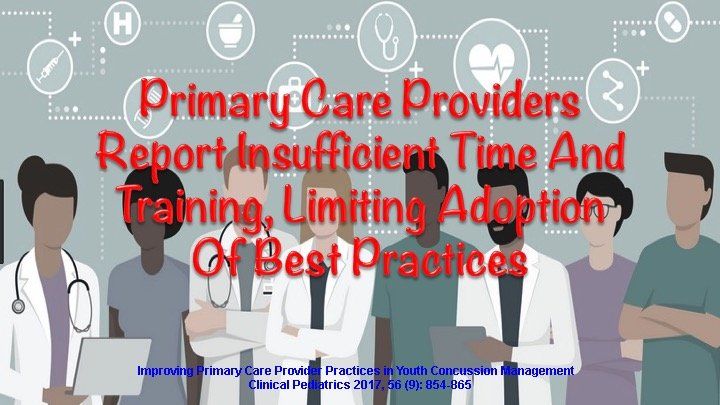More Hands-On Training Needed
Comment by Dr. Mladenoff
Primary Care doctors report that they do not have adequate training to deal with concussions AND they do not have enough patient time to properly evaluate these conditions.
The study focused on Vestibular Oculomotor examination, Return to Play and Return TO Learn Guidelines.
They conclude that the key to change doctor behaviour around concussion care is more in person training and electronic decision making tools.
This study outlines the significant deficit in clinical skills to evaluate concussions. The examination procedure was limited to vestibular oculomotor evaluation and although this may meet guidelines for research publication it can be repeated for every appropriate examination procedure that must be performed to properly evaluate concussions. This would reveal additional inadequate clinical skills and training such as vestibulo-cerebellar evaluation and vestibulo-spinal evaluation.
Electronic decision making tools may decrease time requirements and possibly be deligated to support staff, however this does not replace clinical decision making capabilities and is inapplicable for on-site game time management.
The Return To Play and Return To Learn Guideline recommendations were also reviewed and recommended.
The most urgent recommendation is that in-person training is THE key to providing doctors with the necessary clinical skills to better assess and treat concussed patients.
Improving Primary Care Provider Practices in Youth Concussion Management. Clinical Pediatrics 2017, 56 (9): 854-865
Abstract:
Primary care providers are increasingly providing youth concussion care but report insufficient time and training, limiting adoption of best practices. We implemented a primary care-based intervention including an electronic health record-based clinical decision support tool ("SmartSet") and in-person training.
We evaluated consequent improvement in 2 key concussion management practices:
1) performance of a vestibular oculomotor examination and
2) discussion of return-to-learn/return-to-play (RTL/RTP) guidelines. Data were included from 7284 primary care patients aged 0 to 17 years with initial concussion visits between July 2010 and June 2014. We compared proportions of visits pre- and post-intervention in which the examination was performed or RTL/RTP guidelines provided.
Examinations and RTL/RTP were documented for 1.8% and 19.0% of visits pre-intervention, respectively, compared with 71.1% and 72.9% post-intervention. A total of 95% of post-intervention examinations were documented within the SmartSet. An electronic clinical decision support tool, plus in-person training, may be key to changing primary care provider behavior around concussion care.
Primary care providers are increasingly providing youth concussion care but report insufficient time and training, limiting adoption of best practices. We implemented a primary care-based intervention including an electronic health record-based clinical decision support tool ("SmartSet") and in-person training.
We evaluated consequent improvement in 2 key concussion management practices:
1) performance of a vestibular oculomotor examination and
2) discussion of return-to-learn/return-to-play (RTL/RTP) guidelines. Data were included from 7284 primary care patients aged 0 to 17 years with initial concussion visits between July 2010 and June 2014. We compared proportions of visits pre- and post-intervention in which the examination was performed or RTL/RTP guidelines provided.
Examinations and RTL/RTP were documented for 1.8% and 19.0% of visits pre-intervention, respectively, compared with 71.1% and 72.9% post-intervention. A total of 95% of post-intervention examinations were documented within the SmartSet. An electronic clinical decision support tool, plus in-person training, may be key to changing primary care provider behavior around concussion care.

